Front Page | Home | Blog | Index | Site Map | Contact
![]() Marrakesh
Marrakesh
![]() Essaouira
Essaouira
![]() Casablanca
Casablanca
![]() Rabat / Sale
Rabat / Sale
![]() Chefchaouen
Chefchaouen
![]() Fez
Fez
![]() Meknes
Meknes
![]() Volubilis
Volubilis
![]() Atlas
Atlas
![]() City to City
City to City
![]() Eid Al Adha
Eid Al Adha
![]() Jan and Gerry
Jan and Gerry

2011 Frontpages & Stays
- 2011.12.23
- 2011.10.29
- 2011.07.25
- 2011.05.28
- 2011.03.31
- 2011.01.25
- Florence
- Rome
- Italy
- Paris
- Morocco
- London
2010 Fronpages & Stays
2009 Frontpages & Stays
2008 Front Pages
2007 Front Pages
2006 Front Pages
- 2006.12.12
- 2006.11.21
- 2006.11.04
- 2006.10.23
- 2006.10.09
- 2006.09.26
- 2006.09.10
- 2006.07.15
- 2006.05.30
- 2006.01.01
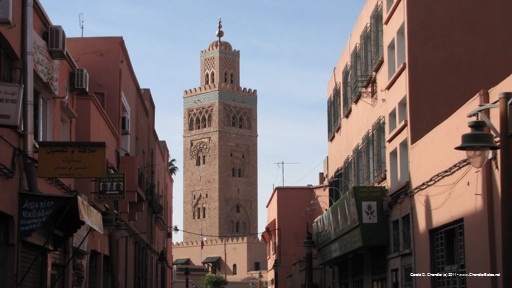
Marrakesh |
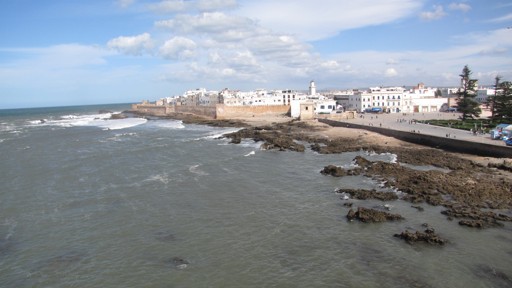
Essaouira |
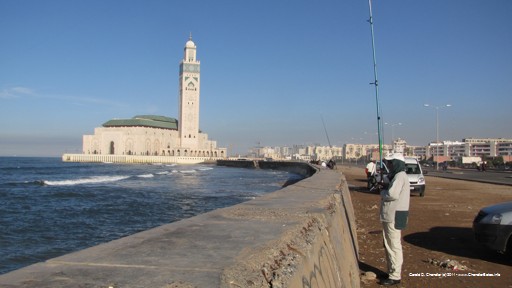
Casablanca |
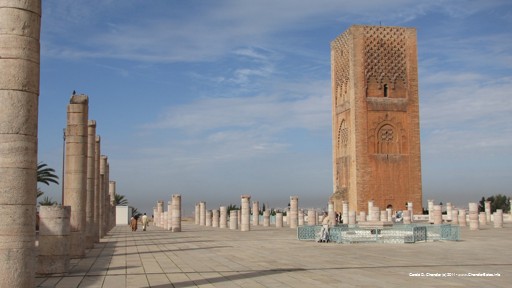
Rabat |
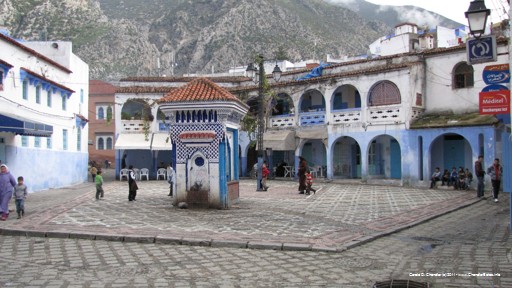
Chefchaouen |
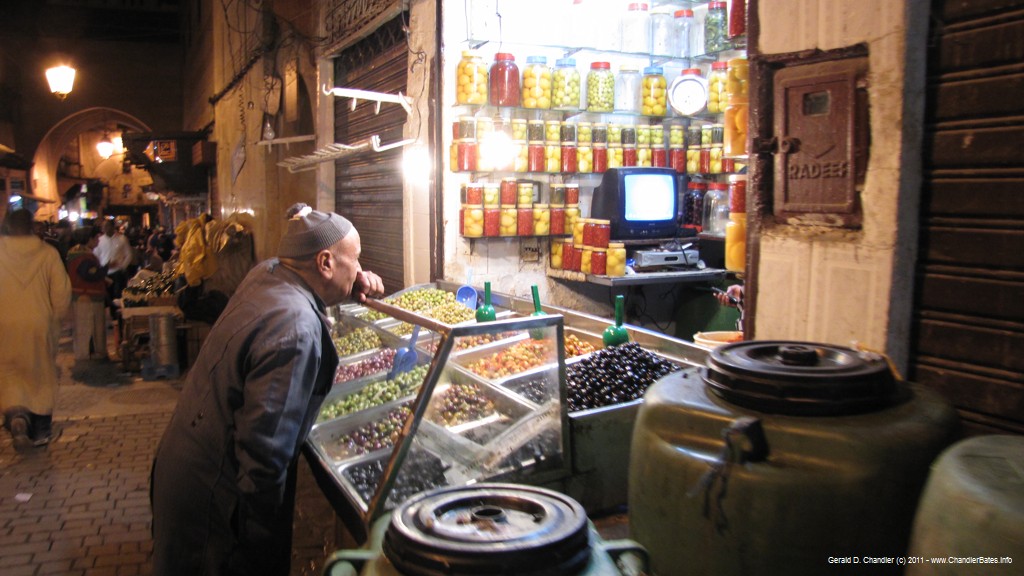
Fez |
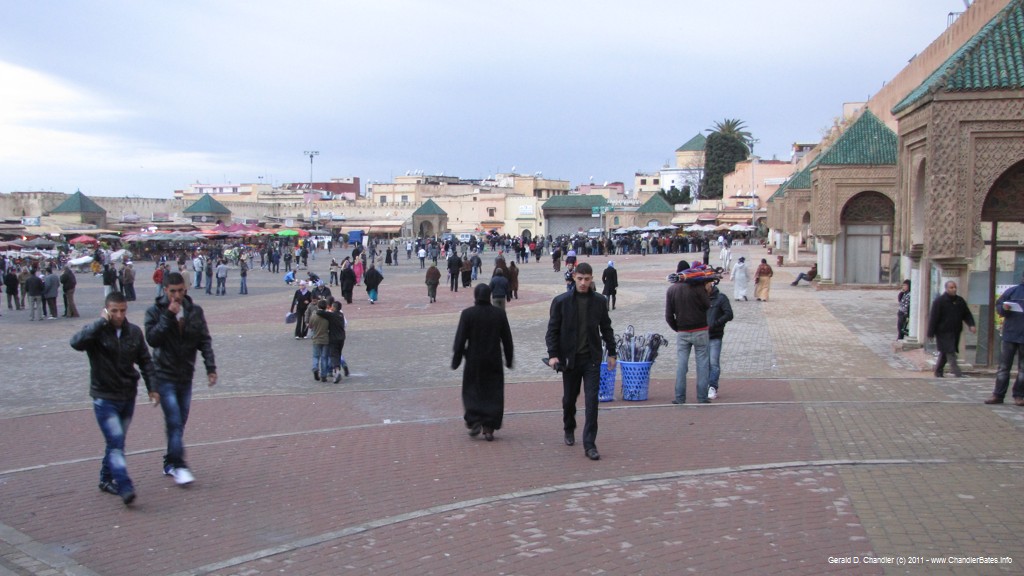
Meknes |
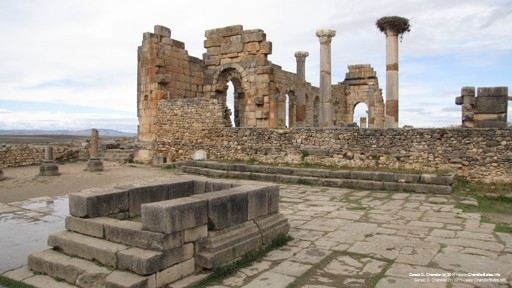
Volubilis |
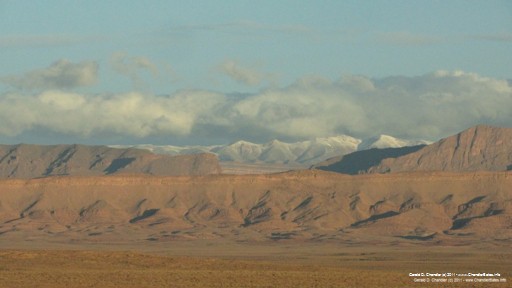
Atlas |
Only as we were starting the last of our four weeks in Morocco did Gerry remember that we almost lived here! Jan was a bit astonished to hear this, but as he told his story she remembered it too. We had just arrived in Errachidia in the High Atlas and were having a late evening tea with two people we had just met. Actually, they had almost hijacked us on the street: they saw we were foreigners and hoping that we were English speakers came up to us and said hello. One, Sam, an American, was spending a year in Morocco on a fellowship; he severely lacked English people to speak with. The other, Driss, a Moroccan, was employed as a Peace Corp facilitator and he, Sam's friend, wanted all the chances he could get to improve his English.
It was in talking with them that Gerry remembered the story: In 1977 we were living in Tehran, Iran, and wondering what to do when we left Iran after two years of living there. Gerry found an advertisement for a job in Morocco; as best as he can remember it was with the Ministry of Education, in some way connected with reforming Moroccan higher education. He applied and then heard nothing, so in November, 1977 we left on a trip that would take us to Afghanistan, Pakistan, India, and points beyond. In February, 1978 we were in Madurai (southern India) when a letter from the Moroccan ministry caught up with us: the job was Gerry's; please reply within 15 days. Unfortunately the letter was dated 30 days or so before Gerry got it. Nonetheless he sent a telegram accepting. A response came soon: Gerry was too late, the job had been offered to somebody else. And instead of first visiting Morocco in 1978 we didn't make it until 2011.
And we almost didn't make it this year. We had to leave Paris by about November 1, to vacate Veronica's apartment for her return from a pilgrimage. What direction should it be? Maybe north to Germany and Scandinavia? Too cold! Maybe to South America? To far and too little time -- we had to be in England in December? So even if it was cous-cous instead of porridge, the time, price, and flavor were just right and we were off to Marrakesh, Morocco, by EasyJet
Even before we arrived we were basically familiar with Morocco because it is so similar to Iran, where we lived 1975-1977. Both are Islamic countries, situated in dry regions, that are very poor compared to Europe and the USA. These cultural and geographic conditions result in many similarities in housing, food, and cultural behavior. This even extended to the city we got to know best, Marrakesh. Like Tehran, where we lived 27 months, it is located on a high dry plain, with mountains that rise as much as 9000 feet (2700 meters) above it as a backdrop. Our last few days in Marrakesh the mountains were covered with snow and reminded us of the Iranian Alborz.
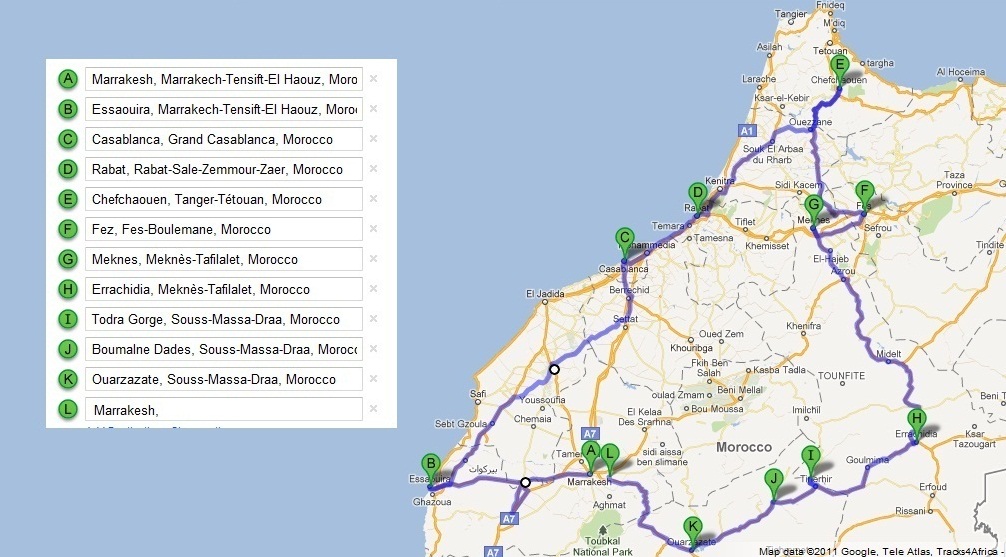
2100 km, 27 day travels in Morocco |
Two things that were new to us and not to be found in Iran are riads and maze-like medinas; they sort of go together. A riad, as the term is used in Morocco, is a house with a courtyard that has been converted to a hotel. Houses are generally built adjacent to their neighbors with no windows on the sides and few to none on the front and back. Light comes in from the courtyard, which in a large house can be very large; in a tiny place the courtyard is just big enough to avoid claustrophobia. Medina is a word that in Arabic literally means “city” but in tourist-Morocco means the old town, where there are relatively few streets which can be reached by automobile and the homes are crowded together on little dead-end alleys mostly less that two meters wide.
In Marrakesh, Essaouira, and Fez and we stayed in riads located in the medina. In all three of these places we had to leave behind a taxi and go 250-500 meters to get to our home for the night. “Porters” with flat wheelbarrow-like carts eagerly offered to move our things but we preferred to use our own tiny wheels. The Essaouira riad was once truly the home of a “bledard” (simple peasant) and had but four rooms. In Fez and later in Marrakesh we stayed in riads that were three times larger and had highly decorated courtyards. Our stays in Chefchaouen and Tizoui. were also in riads but not exactly in the medina. In Chefchaouen we stayed so close to the edge that from our taxi to inn was only 30 meters. The most notable memory there is that we made our own breakfast because the day we left nobody showed up for work! Tizoui near the Todra Gorge is a village and what ever it is, it can't be said to have a medina. Our riad was crammed in between the road into the mountains and the small valley.
Our other over-night stops (see map above) were in Casablanca, Rabat, Meknes, Boumalne, and Ouarzazate. In these cities, as well as two other places in Marrakesh we stayed in modern (or semi-modern) hotels in the so-called “new city”. Most of these new cities were established by the French about the time they made Morocco into a protectorate, i. e., in 1912. Our first hotel in Marrakesh, and thus first in Morocco, was the Diwane Riad. While a modern building it pretended to be a riad but with as much chance of fooling somebody as the Venetian in Las Vegas has of making you think you really are in Italy. We moved after one night to a simpler but modern hotel that we liked betters. In Casablanca we stayed in an art-deco masterpiece that for its day should have been lovely but to us seemed to have fallen on hard times. In Rabat and Meknes we had hotels that were unabashedly 1940-50s French and as such were pleasant and comfortable. A strange but very pleasant amalgram was our hotel in Ouarzazate, the Ibis, part of the French chain. On the outside it was a giant imitation of the nearby fortress or Casbah that is the biggest attraction of Ouarzazate. On the inside it was a thoroughly modern business hotel with an abundance of something that we'd been missing in the rest of the High Atlas: heat and warmth.
The most surprising thing for us about Morocco was how much French we spoke and how useful it was. We'd just come from Paris, where you'll be surprised to learn we hardly spoke French. All our friends spoke English, usually as good as or better than our French, and wanted to get in practice. With businesses/strangers the situation was largely the same. Whenever Gerry opened his mouth in Paris to speak French his broad American accent immediately identified him and he would inevitably be responded to in English. Jan's mastery of French is very high and she doesn't have the accent problem but the response in English happened almost as often to her and left her very frustrated.
In Morocco it was a totally different story. We couldn't communicate in Arabic and the locals knew it without asking. For the most part if they know a second language it is French. With most hotel clerks and taxi driver's that's how we communicated it. (Although with the taxi drivers it was as often with waving of hands and showing a map.) There were exceptions, generally with younger people: once, for example, in a supermarket a question in French got only a quizzical look. Re-put in English, the answer came quickly. (Mostly in the north due to colonial history, but also here and there it is Spanish that is most helpful to the visitor; consequently once in a while we found ourselves dreging up words mastered in our Latin American travels.)
Most of our hotels had satellite TV and included in that were many French-language broadcasts. Almost everywhere we had TV5Monde which nightly re-broadcast the French national news as well as the Swiss national news; we watched both and not only kept up with stories we'd been following in Paris we got re-acquainted with the news readers we'd “met” during our two month stay in Basel in 2008.
The thing that strikes about the people of Morocco is how friendly they are if they are not trying to sell you something. But let them have something to sell and your soul and body may be in danger. Walking along there is a constant refrain of “just come in and look; no need to buy”. But if you do it will be hard to say no. On our last day Jan succumbed: she was offered a leather handbag for 500 dirham (about $60) she refused and tried to walk along. Her tormentor asked how much she would pay; to shake him off she offered a ridiculously low price of 150 dirham ($20). The seller countered with 400 and 300 dirham and, getting refusals, chased her down the alley to snatch a deal for 150 dirham. Two days later in Stockport, England, we saw a similar bag for about 5 pounds ($8).
But besides memories we did come home with souvenirs. Not for ourselves but as house gifts. Our rule is to never buy and never offer something we wouldn't want to have ourselves. We found all we wanted in a tiny shop, midway between the true medina of the locals and the medina of the tourists. While his goods were for tourists all of this neighboring shops were selling to locals, including meat, vegetables, and minor dry goods. We bargained hard with him, obviously refusing his initial price. Along the way he told us that if he accepted one of our offers he'd take in just enough to cover his costs. We never believed him and the fact that he eventually accepted that offer shows that he must have made a handsome profit off of us; we suspect it was more than the average day's wages. But we think we got value for money: we liked the stuff and were very happy to be taking it away with us.
We left Marrakesh and Morocco like we arrived, on a magic carpet provided by Easyjet. It is a miracle that in the morning one can be in Paris and the evening in Marrakesh. And, we thought it near miraculous that having spent another fruitful day adding to our list of “accomplishments” in Marrakesh as the sun set we went off to Merina airport, flew over carpets of light outlining cities (perhaps the Seville area?)toward England, and as the midnight hour approached, landed in Manchester.